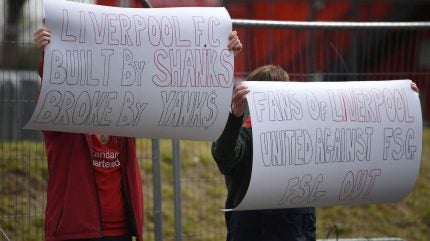

At a time when sentiment in many parts of the world has turned against foreign direct investment, along come a group of football club owners to further poison the pool.
The debacle that was the aborted ‘Super League’ for European football clubs demonstrates how foreign owners of key national assets can completely alienate themselves from their customer base.
The league, which was launched and then scrapped within two days, would have created a closed competition for the richest European football clubs, would have undermined domestic competitions and would have further increased the breakaway clubs’ wealth.
The 12 clubs that were proposing, and would have owned, the competition tried to sell the concept based on the needs of younger fans with short attention spans. Yet it was a fan backlash, particularly in England, that was one of the main drivers of the league’s speedy demise.
So how could these club owners have got it so wrong?
While these types of blunders remain pretty rare in most areas of business, they are depressingly common in football.
How well do you really know your competitors?
Access the most comprehensive Company Profiles on the market, powered by GlobalData. Save hours of research. Gain competitive edge.
 Company Profile – free sample
Company Profile – free sampleThank you!
Your download email will arrive shortly
Not ready to buy yet? Download a free sample
We are confident about the unique quality of our Company Profiles. However, we want you to make the most beneficial decision for your business, so we offer a free sample that you can download by submitting the below form
By GlobalData
The owners of some of the Spanish and Italian clubs involved seem to have been driven primarily by financial desperation, facing rising debts and falling revenues thanks to the Covid-19 pandemic. Not wanting to cut costs, like most businesses would under similar circumstances, they instead wanted to increase their guaranteed revenues at the expense of their smaller rivals.
The motivation for the English clubs was more nuanced than their continental partners, however. Russian billionaire Roman Abramovich or Sheikh Mansour bin Zayed Al Nahyan of Abu Dhabi are far less concerned about falling revenues at their respective clubs, Chelsea and Manchester City, and perhaps just didn’t want to get left behind. The American owners of Liverpool, Manchester United and Arsenal seem to have spied an opportunity to turn their historic institutions into US-style franchises.
That these super-rich clubs didn’t anticipate the anger their plans would unleash may seem surprising. Yet anyone who follows football in England will know that of all types of foreign investment, incompetent decision-making is remarkably common among club owners.
Football club owners are uniquely incompetent
All kinds of companies, big and small, make major strategic errors of course, and foreign investments can prove particularly tricky.
Matt Haig’s book Brand Failures, published in 2003, details some of the most famous cross-border mistakes made by major companies, such as Mitsubishi launching a car in Spain with a name that locally means self-gratification, and Kellogg’s ill-fated first attempts to enter the Indian market, which had no culture of eating cereals for breakfast.
While these types of blunders remain pretty rare in most areas of business, they are depressingly common in football.
Football clubs in the top two divisions of English football have become increasingly attractive to foreign investors over the past couple of decades, to the extent that less than half the clubs are now majority owned by British nationals. In the Premier League, only three out of 20 clubs are not foreign owned.
Although international investor appetite for English football is high, supporters rarely end up with the most impressive international businessmen running their clubs.
Classic cock-ups in recent years include Cardiff City’s Malaysian owner Vincent Tan changing the club’s shirt from blue to red, because he preferred that colour. He backed down after three years of stubbornness amid major fan protest. Hull City owner Assem Allam was forced into a similar reversal after attempting to change the club’s name to Hull Tigers.
Turns out fans get pretty upset when foreign owners mess with traditions that have existed for more than 100 years. Who knew?
Then you have the financial fiascos. Coventry City have spent most of the past ten years not playing in the stadium that was built for them due to a dispute over a rent, and sadly, there is a growing number of historic teams that have either gone out of business, or plummeted down the football pyramid due to crippling debts created by financial mismanagement.
A super kind of failure
While ownership gaffes are depressingly common further down the football pyramid, the Super League fiasco demonstrates that even the owners of the most successful clubs in England don’t really understand what they are selling.
Only in football do investors so regularly misunderstand the business they own. Only in football are billionaires so regularly brainless.
Something those uninterested in football often understandably misunderstand is that the attraction of the sport is as much to do with narrative as sporting prowess. Like a blockbuster film or TV series, football is full of heroes and villains, grand failures and underdog stories, loyalty and betrayal, bravery and cowardice.
The fundamental mistake of the dirty dozen was not appreciating how most football fans love to see big clubs (they don’t support) fail. Watching one of the richest clubs in the world knocked out of a major tournament by a smaller rival is one of the most satisfying things about watching football. It is a great story you can share and reflect on with friends, family or complete strangers.
By trying to create a tournament where none of the rich clubs could ever really fail again, these owners provoked a tsunami of opposition that could potentially undermine their continued ownership.
Only in football do investors so regularly misunderstand the business they own. Only in football are billionaires so regularly brainless.






